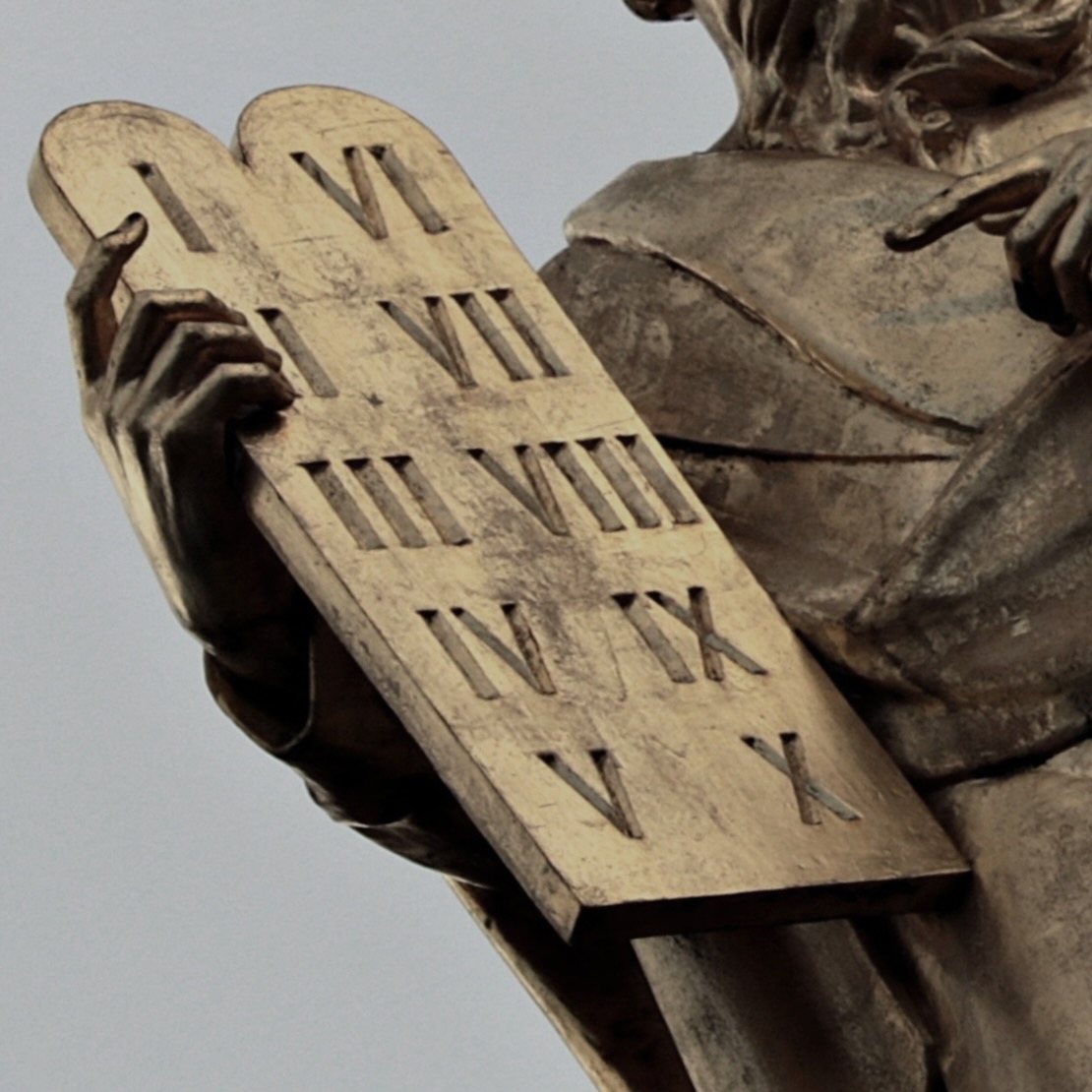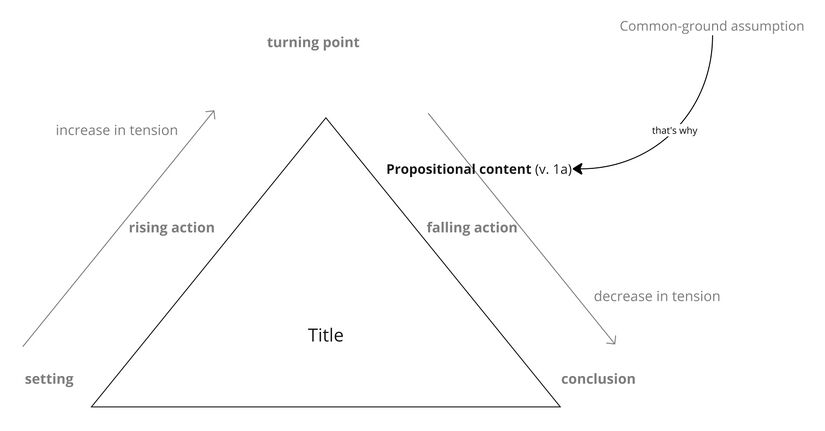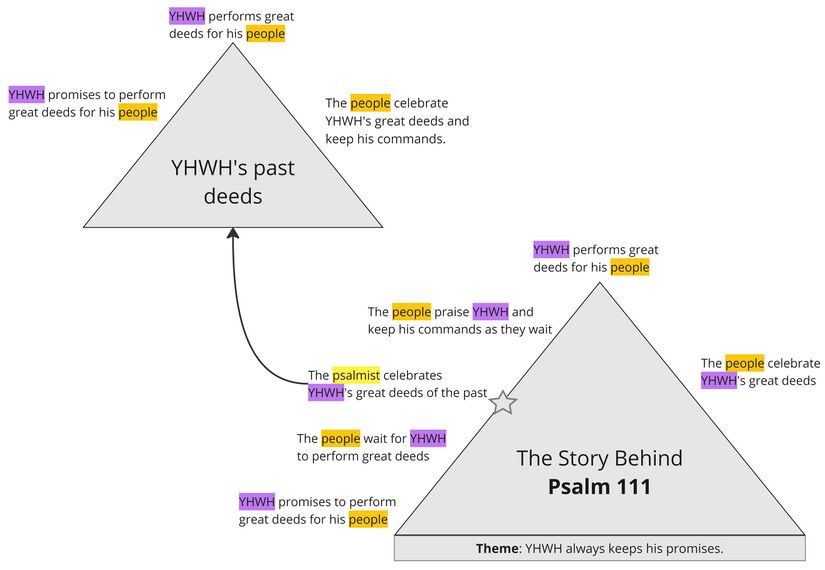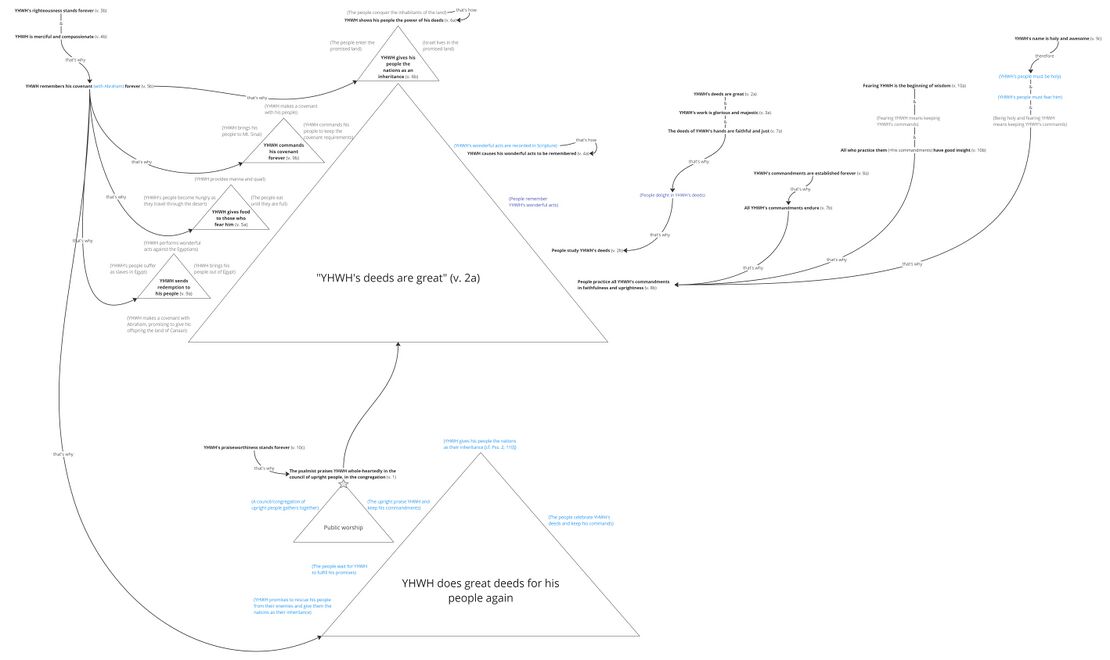Psalm 111 Story Behind
Guardian: Ryan Sikes
About the Story Behind Layer
The Story Behind the Psalm shows how each part of the psalm fits together into a single coherent whole. Whereas most semantic analysis focuses on discrete parts of a text such as the meaning of a word or phrase, Story Behind the Psalm considers the meaning of larger units of discourse, including the entire psalm.
The goal of this layer is to reconstruct and visualize a mental representation of the text as the earliest hearers/readers might have conceptualized it. We start by identifying the propositional content of each clause in the psalm, and then we identify relevant assumptions implied by each of the propositions. During this process, we also identify and analyze metaphorical language (“imagery”). Finally, we try to see how all of the propositions and assumptions fit together to form a coherent mental representation. The main tool we use for structuring the propositions and assumptions is a story triangle, which visualizes the rise and fall of tension within a semantic unit. Although story triangles are traditionally used to analyze stories in the literary sense of the word, we use them at this layer to analyze “stories” in the cognitive sense of the word—i.e., a story as a sequence of propositions and assumptions that has tension.
Summary Triangle
The story triangle below summarises the story of the whole psalm. We use the same colour scheme as in Participant Analysis. The star icon along the edge of the story-triangle indicates the point of the story in which the psalm itself (as a speech event) takes place. We also include a theme at the bottom of the story. The theme is the main message conveyed by the story-behind.
| Story Triangles legend | |
|---|---|
| Propositional content (verse number) | Propositional content, the base meaning of the clause, is indicated by bold black text. The verse number immediately follows the correlating proposition in black text inside parentheses. |
| Common-ground assumption | Common-ground assumptions[1] are indicated by gray text. |
| Local-ground assumption | Local-ground assumptions[2] are indicated by dark blue text. |
| Playground assumption | Playground assumptions[3] are indicated by light blue text. |
| The point of the story at which the psalm takes place (as a speech event) is indicated by a gray star. | |
| If applicable, the point of the story at which the psalm BEGINS to take place (as a speech event) is indicated with a light gray star. A gray arrow will travel from this star to the point at which the psalm ends, indicated by the darker gray star. | |
| A story that repeats is indicated by a circular arrow. This indicates a sequence of either habitual or iterative events. | |
| A story or event that does not happen or the psalmist does not wish to happen is indicated with a red X over the story triangle. | |
| Connections between propositions and/or assumptions are indicated by black arrows with small text indicating how the ideas are connected. | |
| Note: In the Summary triangle, highlight color scheme follows the colors of participant analysis. | |
Background ideas
Following are the common-ground assumptionsCommon-ground assumptions include information shared by the speaker and hearers. In our analysis, we mainly use this category for Biblical/Ancient Near Eastern background. which are the most helpful for making sense of the psalm.
- YHWH made a covenant with Abraham and his descendants, promising to give them the land of Canaan (Gen. 12; 15; 17; cf. Ps. 105:8–11).
- Because of his covenant with Abraham, YHWH redeemed his people from Egypt and brought them into the promised land (cf. Ex. 2:24; 6:2–8).
- YHWH's great deeds and wonderful acts are associated especially with the Exodus story. In the Exodus story, YHWH redeems his people (Ex. 1–15), provides them with food in the desert (Ex. 16), and gives them the law (Ex. 19ff).
- YHWH settled his people in the land so that they would keep his commandments (cf. Ps. 105:44–45).
- The people did not keep YHWH's commands, and so YHWH removed them from the land (cf. Ps. 106).
- Because of his covenant with Abraham, YHWH promised to rescue his people from exile and from the sin that caused the exile, just as he had rescued them from Egypt. He also promised to give them a king, and to give them the nations as their inheritance (cf. Isa. 40–66; Zech. 9–14; Pss. 2; 110; etc.)
Background situation
The background situation is the series of events leading up to the time in which the psalm is spoken. These are taken from the story triangle – whatever lies to the left of the star icon.

Expanded Paraphrase
The expanded paraphrase seeks to capture the implicit information within the text and make it explicit for readers today. It is based on the CBC translation and uses italic text to provide the most salient background information, presuppositions, entailments, and inferences.
| Expanded paraphrase legend | |
|---|---|
| Close but Clear (CBC) translation | The CBC, our close but clear translation of the Hebrew, is represented in bold text. |
| Assumptions | Assumptions which provide background information, presuppositions, entailments, and inferences are represented in italics. |
| Text (Hebrew) | Verse | Expanded Paraphrase |
|---|---|---|
| הַ֥לְלוּ יָ֨הּ ׀ אוֹדֶ֣ה יְ֭הוָה בְּכָל־לֵבָ֑ב בְּס֖וֹד יְשָׁרִ֣ים וְעֵדָֽה׃ | 1 | Praise Yah, who has promised to rescue us from our enemies, to give us a king, and to give us the nations as our inheritance ! While we wait for YHWH to perform these great deeds, I will praise YHWH whole-heartedly in the council of upright people which is here gathered together, that is, in the congregation. |
| גְּ֭דֹלִים מַעֲשֵׂ֣י יְהוָ֑ה דְּ֝רוּשִׁ֗ים לְכָל־חֶפְצֵיהֶֽם׃ | 2 | YHWH’s deeds, especially his deeds of redemption and acts of covenant faithfulness, are great, studied in Scripture by all who delight in them. |
| הוֹד־וְהָדָ֥ר פָּֽעֳל֑וֹ וְ֝צִדְקָת֗וֹ עֹמֶ֥דֶת לָעַֽד׃ | 3 | YHWH is our king, and His work is glorious and majestic, and his righteousness endures forever, even to the present day . |
| זֵ֣כֶר עָ֭שָׂה לְנִפְלְאֹתָ֑יו חַנּ֖וּן וְרַח֣וּם יְהוָֽה׃ | 4 | He has caused his wonderful acts to be recorded in Scripture and thereby remembered. YHWH is, as he said to Moses in the book of Exodus, merciful and compassionate, forgiving our sins and thus sustaining the covenant he made with us. |
| טֶ֭רֶף נָתַ֣ן לִֽירֵאָ֑יו יִזְכֹּ֖ר לְעוֹלָ֣ם בְּרִיתֽוֹ׃ | 5 | When he brought our ancestors out of Egypt, He gave food — manna and quail — to those who feared him. The reason why he brought them out of Egypt and provided food for them is because of the covenant he had made with our father Abraham, to whose offspring he had promised to give the land of Canaan. And just as he remembered his covenant then, so He will remember his covenant forever and he will keep his promises to us. |
| כֹּ֣חַ מַ֭עֲשָׂיו הִגִּ֣יד לְעַמּ֑וֹ לָתֵ֥ת לָ֝הֶ֗ם נַחֲלַ֥ת גּוֹיִֽם׃ | 6 | After rescuing his people from Egypt and sustaining them in the wilderness, he continued to do wonderful deeds for his people which demonstrated his power in an even greater way: He showed his people the power of his deeds by keeping his promise to Abraham and giving them nations as an inheritance. |
| מַעֲשֵׂ֣י יָ֭דָיו אֱמֶ֣ת וּמִשְׁפָּ֑ט נֶ֝אֱמָנִ֗ים כָּל־פִּקּוּדָֽיו׃ | 7 | The deeds of his hands are faithful and just, including his act of giving us the law. All his commandments are enduring, |
| סְמוּכִ֣ים לָעַ֣ד לְעוֹלָ֑ם עֲ֝שׂוּיִ֗ם בֶּאֱמֶ֥ת וְיָשָֽׁר׃ | 8 | All his commandments are enduring, because they have been established by YHWH to last forever and ever, and so they are practiced even to this day by his people in faithfulness and uprightness. And so, while we wait for YHWH to remember his covenant and perform great deeds once again, we too must remember to keep the covenant requirements YHWH has given us. |
| פְּד֤וּת ׀ שָׁ֘לַ֤ח לְעַמּ֗וֹ צִוָּֽה־לְעוֹלָ֥ם בְּרִית֑וֹ קָד֖וֹשׁ וְנוֹרָ֣א שְׁמֽוֹ׃ | 9 | When our ancestors were slaves in Egypt, He sent redemption to his people. He brought us out of Egypt to Mt. Sinai, where He gave us the law and commanded that his covenant requirements be observed forever. His name is holy and awesome, which means that his people must be holy and must fear him. |
| רֵ֘אשִׁ֤ית חָכְמָ֨ה ׀ יִרְאַ֬ת יְהוָ֗ה שֵׂ֣כֶל ט֭וֹב לְכָל־עֹשֵׂיהֶ֑ם תְּ֝הִלָּת֗וֹ עֹמֶ֥דֶת לָעַֽד׃ | 10 | And we should fear YHWH, not only because he is to be feared, but because Fearing YHWH and keeping his commandments is the beginning of wisdom; all who practice them, that is, his commandments, have good insight. Just as his righteousness and covenant faithfulness endure forever, so too His praiseworthiness endures forever which is why I praise him in the congregation today, even as I wait for him to perform great deeds once again. |
There are currently no Imagery Tables available for this psalm.
Bibliography
- Allen, Leslie. 1983. Psalms 101-150. WBC 21. Waco: Word Books.
- Auffret, Pierre. 1997. “Grandes sont les œuvres de YHWH: Etude structurelle du Psaume 111.” JNES 56 (3): 183–96.
- Baethgen, Friedrich. 1904. Die Psalmen. Göttingen: Vandenhoeck und Ruprecht.
- Brettler, Marc Zvi. 2009. “The Riddle of Psalm 111.” Pages 62–73 in Scriptural Exegesis. Edited by Deborah A. Green and Laura S. Lieber. Oxford: Oxford University Press.
- Dahood, Mitchell J. 1970. Psalms III, 101-150. AB 17A. Garden City, NY: Doubleday.
- Ehrlich, Arnold B. 1905. Die Psalmen; neu übersetzt und erklärt. Berlin: Poppelauer.
- Fokkelman, J.P. 2003. Major Poems of the Hebrew Bible: At the Interface of Prosody and Structural Analysis (Vol 3: The Remaining 65 Psalms). Studia Semitica Neerlandica. Assen: Van Gorcum.
- Gesenius, W. Donner, H. Rüterswörden, U. Renz, J. Meyer, R., eds. 2013. Hebräisches und aramäisches Handwörterbuch über das Alte Testament. 18. Auflage Gesamtausgabe. Berlin: Springer.
- Gordon, Amnon. 1982. “The Development of the Participle in Biblical, Mishnaic, and Modern Hebrew.” Afroasiatic Linguistics 8 (3): 121–179.
- Hensley, Adam D. 2018. Covenant Relationships and the Editing of the Hebrew Psalter. Library of Hebrew Bible/Old Testament Studies, volume 666. New York: Bloomsbury T&T Clark.
- Hossfeld, Frank-Lothar, and Erich Zenger. 2011. Psalms 3: A Commentary on Psalms 101-150. Hermeneia. Minneapolis, MN: Fortress.
- Hupfeld, Hermann. 1871. Die Psalmen. Vol. 4. Gotha: F.A. Perthes.
- Hurvitz, Avi. 2016. A Concise Lexicon of Late Biblical Hebrew: Linguistic Innovations in the Writings of the Second Temple Period. Leiden: Brill.
- Jastrow, Marcus. 1926. Dictionary of Targumim, Talmud and Midrashic Literature. New York: Verlag Choreb.
- Jenni, Ernst. 1992. Die hebräischen Präpositionen Band 1: Die Präposition Beth. Stuttgart: W. Kohlhammer.
- ________. 2000. Die Hebräischen Präpositionen Band 3: Die Präposition Lamed. Stuttgart: W. Kohlhammer.
- Kiel, Jonathan M. 2022. “A New Thematic Structure for Psalm 111.” Page 107–128 in Like Nails Firmly Fixed (Qoh 12:11): Essays on the Text and Language of the Hebrew and Greek Scriptures, Presented to Peter J. Gentry on the Occasion of His Retirement. Edited by Phillip S. Marshall, John D. Meade, and Jonathan M. Kiel. Leuven: Peeters.
- Kohler, Ludwig. 1954. Hebrew Man. New York: Abingdon Press.
- Lugt, Pieter van der. 2013. Cantos and Strophes in Biblical Hebrew Poetry III: Psalms 90–150 and Psalm 1. Vol. 3. Oudtestamentische Studiën 63. Leiden: Brill.
- Niccacci, Alviero. 2006. “The Biblical Hebrew Verbal System in Poetry.” Page 247–68 in Biblical Hebrew in Its Northwest Semitic Setting: Typological and Historical Perspectives. Edited by Steven E. Fassberg and Avi Hurvitz. Jerusalem: Hebrew University Magnes Press.
- Notarius, Tania. 2010. “The Active Predicative Participle in Archaic and Classical Biblical Poetry.” ANES 47: 241–69.
- Radak. Radak on Psalms.
- Robertson, O. Palmer. 2015. “The Strategic Placement of the ‘Hallelu-Yah’ Psalms within the Psalter.” JETS 58 (2): 165–68.
- Scoralick, Ruth. 1997. “Psalm 111 : Bauplan und Gedankengang.” Biblica 78 (2): 190–205.
- Weber, Beat. 2003. “Zu Kolometrie Und Strophischer Struktur von Psalm 111.” Biblische Notizen 118: 62–67.
Footnotes
- ↑ Common-ground assumptions include information shared by the speaker and hearers. In our analysis, we mainly use this category for Biblical/ANE background - beliefs and practices that were widespread at this time and place. This is the background information necessary for understanding propositions that do not readily make sense to those who are so far removed from the culture in which the proposition was originally expressed.
- ↑ Local-ground assumptions are those propositions which are necessarily true if the text is true. They include both presuppositions and entailments. Presuppositions are those implicit propositions which are assumed to be true by an explicit proposition. Entailments are those propositions which are necessarily true if a proposition is true.
- ↑ Whereas local-ground assumptions are inferences which are necessarily true if the text is true, play-ground assumptions are those inferences which might be true if the text is true.








